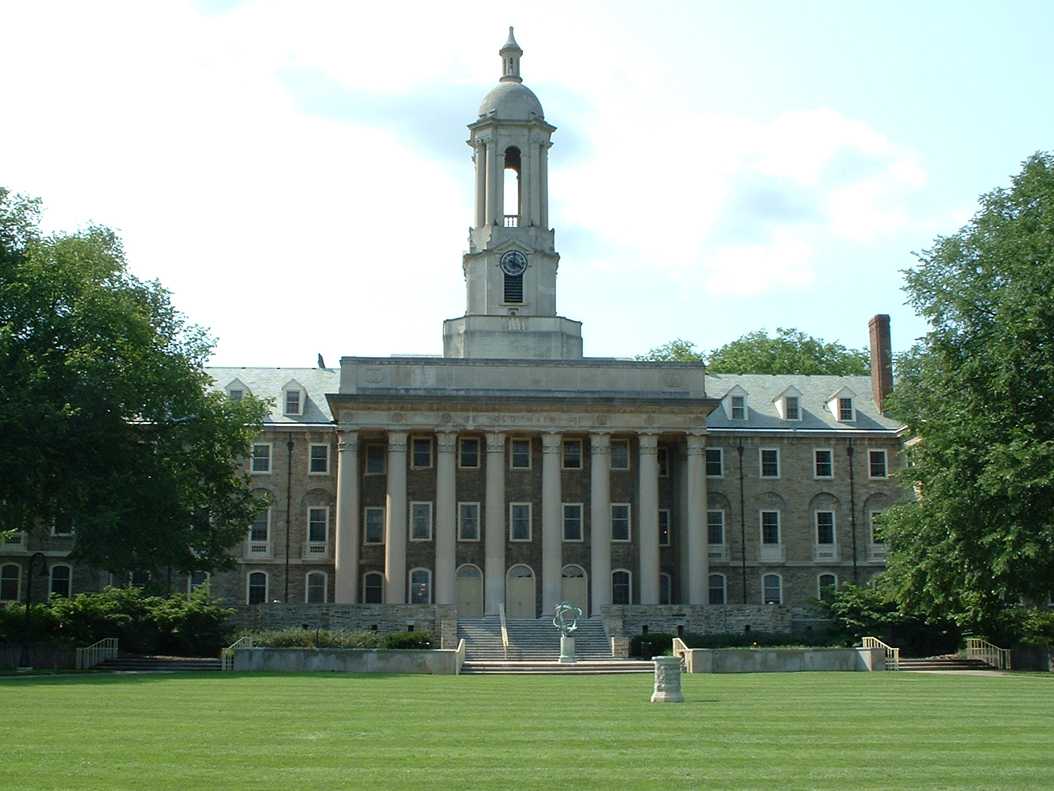Auditor’s concerns with PSU partially apply to Pitt


Penn State's Old Main (Photo via Wikipedia Commons)
The Pennsylvania auditor general harshly criticized Penn State after a recent audit, raising some concerns that apply to other state-related universities, including Pitt.
In his 112-page audit report, Auditor General Eugene Depasquale cited several issues including skyrocketing tuition, a lack of transparency, a decrease in in-state enrollment and an oversized board of trustees.
In a news release, Depasquale criticized PSU’s in-state tuition increase — 535 percent in the past 30 years.
“Simply put, expenses are out of control,” DePasquale said. “Penn State must create a tuition task force that includes board members with a focus on identifying and lowering costs that are driving tuition into the stratosphere.”
According to the U.S. Department of Education, Penn State’s main campus had the third highest tuition of any U.S. public four-year school in the 2014-2015 academic year at $17,502. Pitt’s main campus was ranked first at $17,772.
In addition to rising tuition, DePasquale raised concerns about a lack of transparency among state-related Universities, saying the Right-to-Know Law — which state-related Universities are largely exempt from — should fully apply to all the schools, including Pitt.
“As a recipient of a significant amount of taxpayer dollars… it is high time the General Assembly made Penn State and all state-related related universities subject to the provisions of … the Right-to-Know Law,” he said in a press conference Thursday. “And I strongly urge — because I have to watch my mouth on how I say this — all these institutions to stop lobbying the General Assembly against this.”
University spokesperson Joe Miksch did not comment on Depasquale’s Right-to-Know Law or tuition concerns.
Apart from transparency, much of his report focused on in-state enrollment, noting a 12 percent in-state student decrease at Penn State since 1990, while out-of-state enrollment almost doubled.
“Penn State appears to be part of a growing national trend among public research institutions that give preference to nonresident students as a means of increasing tuition revenue,” DePasquale said. “In essence then, a university can get a ‘better bang for the buck’ by increasing the number of its nonresident students.”
Pitt’s out-of-state enrollment has increased in the past decade, shrinking the proportion of in-state students. However, unlike Penn State, Pitt’s number of in-state students hasn’t decreased significantly.
The number of in-state undergraduates at Pitt’s main campus has remained about the same — 12,743 in 2006 and 12,423 in 2016, according to Pitt’s factbooks. However as overall enrollment has increased — 15,422 in fall 2006 to 18,163 in fall 2016 — the percentage of in-state students has decreased form 83 percent in 2006 to 68 percent in 2016.
Miksch said that Pitt’s national reputation and a jump in overall enrollment explain why out-of-state enrollment has risen.
“Over the past decade, the number of undergraduate applications we received from out-of-state has nearly quadrupled. The number of applications from Pennsylvania residents has also increased [by 50 percent],” Miksch said, adding that the increase in out-of-state enrollment has occurred during a overall enrollment increase.
The auditor general also stated in the release that the PSU board of trustees had grown quite large, having gained four voting and two non-voting members since November 2012. He called for the General Assembly to cut the size of the board of trustees for all state-related institutes of higher education.
According to the 2011 Association of Governing Boards of Universities and Colleges Survey, boards of public schools range from a low of five to a high of 36 — the number of voting members on Pitt’s board.
Correction: A previous version of his article said the number of in-state students at Pitt has increased from 17 percent to 32 percent. Those are the numbers for out-of-state, not in-state, and the article has been updated to reflect this correction. The Pitt News regrets this error.
Recent Posts
Hiring freeze raises staffing concerns for Pitt language departments
As preparation begins for the 2025-26 academic year, Pitt’s language departments face uncertainty amid the…
Pitt workers agree to new one-year contract
Pitt service workers finished negotiating a one-year contract at the beginning of March that included…
Review | Playboi Carti finally drops new album, ‘Music,’ after five years
Carti finally dropped, which means the longest-running joke in rap music is over. Playboi Carti…
Accounting students offer free tax filing assistance to Pitt community
The Volunteer Income Tax Assistance program, led by Pitt Business accounting students, offers free tax…
SGB promotes Sex Ed Week and encourages students to attend
At its weekly meeting on Tuesday evening at Nordy’s Place, Student Government Board raised awareness…
Pitt loses four players to the transfer portal
In the first two days of the NCAA basketball transfer portal spring cycle, Pitt has…

